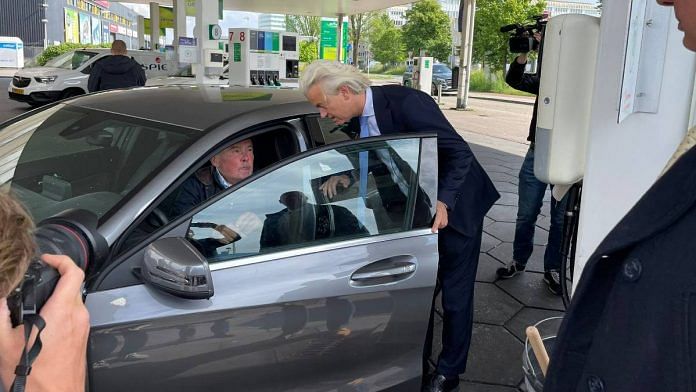New Delhi: Suspended BJP leader Nupur Sharma, at the centre of the ‘blasphemy controversy’ that has caused some unease in India’s diplomatic relationships across West Asia, is being publicly shunned by her party. However, she has found a spokesperson in one of Europe’s most polarising political figures.
Geert Wilders, a Dutch politician who has long advocated a ban on the Quran and action to limit Muslim immigration, has made multiple appearances on Indian media, in Sharma’s support.
“I support Nupur Sharma because I believe that nobody should be punished or apologise for speaking the truth. We might like it, we might dislike it, but she spoke the truth about Muhammad,” said Wilders in an interview to India Today Wednesday.
“If Nupur Sharma can be targeted, so can you,” he sought to warn viewers in an interview to Swarajya magazine Thursday.
Wilders, who founded the anti-immigration Party for Freedom (PVV) in the Netherlands in 2006, has, among other things, suggested measures such as imposing a tax on wearing the hijab (calling it a “symbol of oppression“), and pulling the Netherlands out of the European Union.
The bleach blond politician’s hardline views on Islam and immigration policies have earned him the nickname “Dutch Donald Trump” in some sections of the Western media.
In August 2019, Wilders appeared to celebrate the Narendra Modi government’s decision to revoke the special status (Article 370) of Jammu & Kashmir by calling India a “full democracy” and Pakistan “a 100 per cent terror state”.
India is a full democracy.
Pakistan is a 100% terror state.So the choice is easy.
Welcome home #Kashmir. #IndiaForKashmir ??
— Geert Wilders (@geertwilderspvv) August 5, 2019
He also hailed former Pakistan PM Imran Khan’s ouster this April, calling the cricketer-turned-politician an “Islamic extremist”.
President and islamic extremist @ImranKhanPTI is removed from office. Good riddance.
He was a supporter of terror and an enemy of freedom, democracy and India. #khan #ImranRiazKhan #Pakistani #imrankhanPTI
— Geert Wilders (@geertwilderspvv) April 9, 2022
Wilders and his family have been under police protection since 2004. This was provided after Dutch film-maker and writer Theo van Gogh, who made a television film critical of Islam, was shot at and stabbed to death in Amsterdam. The authorities feared that Wilders, known as a fierce critic of Islam, could be the next target.
Since 2017, a special unit of the military police, typically meant to secure embassies in countries such as Iraq and Afghanistan, was added to his protection following a security scare.
Also read: India bending before Arabs isn’t good for Muslims. Their loyalty will now be more suspect
Born and raised amid massive labour immigration
Wilders was born in September 1963 in a Roman Catholic middle-class family in Venlo, a small city in the Netherlands.
During the 1960s, the Netherlands saw a massive influx of immigrants from countries like Turkey and Morocco, to fill the labour gaps created after World War 2.
As a 2001 research paper published by Amsterdam-based Tinbergen Institute points out, it was in this decade that the Netherlands shifted from an “emigration country to immigration country”.
Wilder’s father worked at a printing company and his mother was half-Indonesian, which a report in TIME magazine says is “a side of his family tree that he has distanced himself from”.
Politics aside, Wilders is known for making a 2008 short film titled Fitna that “attempts to point out how the Quran motivates its followers to hate all who violate Islamic teachings”. The film has widely been regarded as “anti-Muslim” though critics pointed out that it wasn’t all that imaginative as it only used archived images and YouTube clips.
Foray into politics, formation of PVV
In 1988, Wilders joined the centre-right People’s Party for Freedom and Democracy (VVD), widely considered the forerunner of the far-right party Wilder would form in 2006. In 1997, Wilder became a local representative in Utrecht and became a close aide of Frits Bolkestein, a retired Dutch politician and former Member of the European Commission who also holds an anti-immigration stance.
In 2010, while speaking to Dutch magazine Elsevier, Bolkestein had advised Jews in the Netherlands to emigrate to the US or Israel “because of anti-Semitism, specifically in Dutch Moroccans, who continue to grow in number”.
It was during Wilder’s early days of politics in Utrecht and shadowing Bolkestein that he decided to bleach his brown hair, a report in Politico said.
In 1998, Wilders was elected to the Dutch parliament as a member of the VVD. It was after the 9/11 terrorist attacks in the US and its ripple-effects in Europe that Wilder re-shaped his politics. In 2004, citing irreconcilable differences over the VVD’s position on allowing Turkey to join the European Union, Wilders left the party to form his own.
Among several controversial promises, the party has campaigned for shutting down every mosque in the Netherlands and ban the Quran from public buildings.
Wilders has been known to make inflammatory remarks, especially against Islam, Muslims and immigrants. He once likened the Quran to Adolf Hitler’s Mein Kampf and, in 2016, was found guilty of inciting discrimination against Dutch Moroccans over remarks made in a televised speech in 2014.
Wilders is also known to use fake news against political opponents. In 2017, ahead of general elections, he tweeted a doctored photograph of social-liberal politician Alexander Pechtold at a protest holding up a sign that purportedly read: “Islam will dominate the world, freedom can go to hell”. The doctored photograph sparked a row over fake news in the Netherlands.
(Edited by Nida Fatima Siddiqui)
Also read: Arab nations should restrict ties with India to trade, not comment on our internal dynamics



